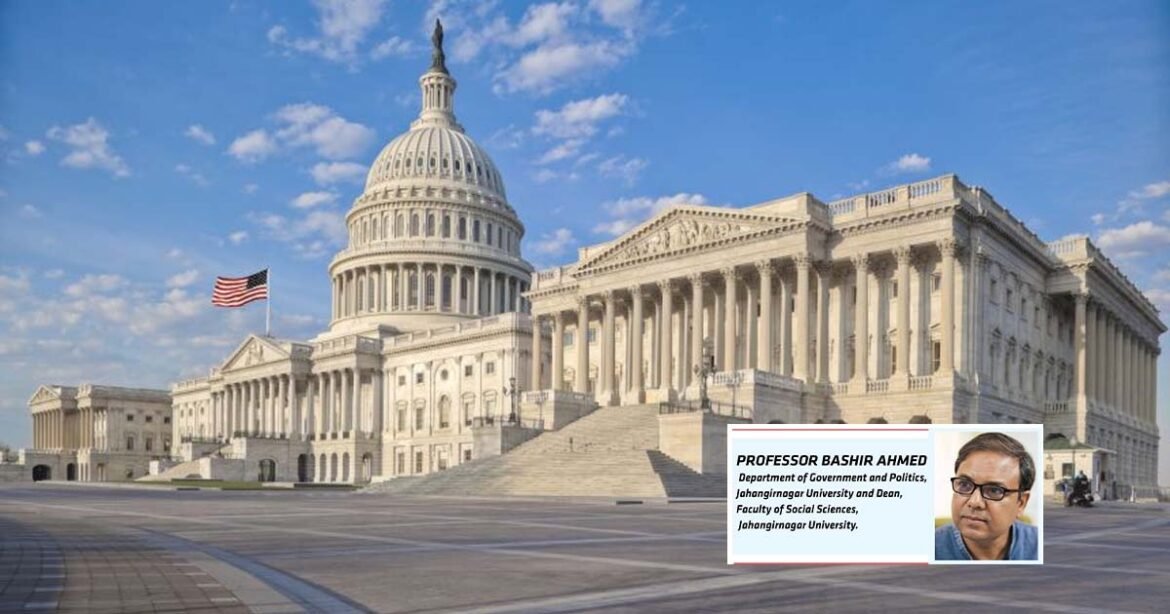How that might affect the upcoming general election of Bangladesh is difficult to foresee. However, that might spark something akin to a legal and legitimate intellectual debate. A new topic, I think, has been added to the ongoing political debate thanks to a letter from 14 congress members to the US representative to the UN calling on Bangladesh to organize free, fair, and credible elections. As reflected in the signed letter, the UN takes part in monitoring and holding free and fair elections in Bangladesh along with impartial countries from across the world. The letter, signed by 14 US congressmen, stated that this should include the deployment of peacekeeping forces to avoid voter intimidation, harassment, or assault.
The media report based on the letter of 14 Congressmen went on to say that Sheikh Hasina’s administration was
“using brute force to deny the people their right to free and fair elections, and to obstruct media freedom and the work of human rights activists.”
They urged the ambassador to seek the UN to block the deployment of Rapid Action Battalion (RAB) members in peacekeeping operations until cases of the special force’s alleged human rights violations are investigated. The letter from the 14 lawmakers stated that
“alleged abuses by RAB include torture, enforced disappearances, and extrajudicial killings, demanding immediate condemnation.”
According to the US congressmen’s letter, Bangladesh’s participation in the human rights council should be immediately suspended until an investigation into the government’s alleged crimes against journalists and political opponents is completed. Earlier on June 14, six US congressmen wrote to US Secretary of State Antony Blinken urging him to help Bangladesh have free and fair elections. UN human rights experts have also cautioned Bangladesh on numerous occasions about its long-running persecution of journalists and human rights advocates. Torture, enforced disappearances, and extrajudicial executions are among the particularly serious claimed violations of the paramilitary Rapid Action Battalion (RAB), which call for swift condemnation.

Seven current and former RAB officers, including the police chief at the time, Benazir Ahmed, were sanctioned by the United States in 2021. However, despite the sanctions, the government is reportedly still waging a reign of terror that has only grown more violent and intimidatory. Does the letter addressed to the US Envoy in UN HQ speak about the geo-political and strategic interest of the US towards Bangladesh that needs to be clarified in brief before reflecting on the next parliamentary election of Bangladesh? In October 2020, Bangladesh was invited by the US to join the Quad, identifying it as a significant partner in the Indo-Pacific region.
Later, Bangladesh was requested to join the US-led IPS (Indo-Pacific Strategy). In response, China offered Bangladesh the opportunity to join its Global Development Initiative and Global Security Initiative as well as a warning that joining the Quad would affect Bangladesh’s relations with China. The US and Russia have also engaged in a verbal battle over Bangladesh, with the Russian Foreign Ministry accusing the US ambassador in Dhaka of attempting to sway the country’s internal affairs and the Russian Embassy in Dhaka criticizing nations with “hegemonic ambitions” who meddle in other countries internal affairs under the guise of defending democratic rights.
Officials in the Biden administration emphasize the significance of free and fair elections in Bangladesh, but in private they also say they do not want to have to decide if U.S. policy toward the nation changes in the case of a rigged vote. This choice is probably intended to be avoided by the new visa policy, which provides great motivation for Bangladesh’s political leaders to assure free and fair elections. A major policy dilemma for Washington, excluding geopolitical factors, looms: What if Bangladesh’s 2024 election is not free or fair, notwithstanding the new U.S. visa restriction? Washington might then be forced to reconsider its approach to Dhaka, something it had hoped to avoid doing.
To me, in accordance with applicable laws and regulations, the Election Commission shall make every effort to ensure and enforce the administration’s and police’s impartiality. Elections must be inclusive in a multi-party democratic system in accordance with the letter and the spirit of the Constitution. The international community’s perception of the election and its level of acceptance is one thing. However, how Bangladeshis will react to the election is of greater importance. I believe elections should be seen and understood by the public to have been inclusive, participatory, free, and fair. If not, the Constitution’s Article 7’s definition of the word “Republic” will not be fulfilled.
Like me, many observers (Political Scientists, Political Analysts, Election Experts and Researchers) believe that new conditions have arisen in the political arena of the nation as a result of the US’s declaration of a new visa policy for Bangladesh, ensuring that the nation’s upcoming parliamentary elections are held in a free and fair manner. People demand dialogue between the political parties to find a peaceful and credible manner to make the upcoming election inclusive and participatory in order to ease the present political tension as well as take the momentum of sustainable development forward without back and forth. Both major political parties believe that we can easily resolve this issue by respecting people’s aspirations and the Constitution.


